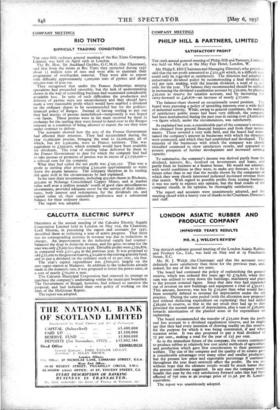COMPANY MEETINGS
RIO TINTO
DIFFICULT TRADING CONDITIONS
THE sixty-fifth ordinary general meeting of the Rio Tinto Company, Limited, was held on April 29th in London.
The Rt. Hon. Sir Auckland Geddes, G.C,M.G. (the Chairman), said that from the mines at Rio Tinto they extracted during 1937 about i million tons of ores and were able to maintain their programme of overburden removal. They were able to export with difficulty approximately 1,20o,000 tons of pyrites and about 200,000 tons of iron ore.
They recognised that under the Franco Authorities mining operations had proceeded smoothly, but the lack of understanding shown in the way of controlling business had occasioned considerable avoidable loss. In spite of such difficulties the production and delivery of pyrites were not unsatisfactory and they should have made a very reasonable profit which would have enabled a dividend on the ordinary shares to be recommended but for the politico- financial policy of Burgos. Instead of having sterling to pay out they had masses of pesetas immobilised—temporarily it was hoped —in Spain. These pesetas were in the main received by them in exchange for the sterling they were forced to hand over to the Burgos treasury as a condition of being allowed to export the ore they were under contract to deliver.
The accounts showed how the acts of the Franco Government had affected their interests. They had accumulated during the year ii,00o,000 pesetas, bringing the total to 22,000,000, all of which, but for 2,500,000, were in Franco territory. This was equivalent to £500,000, which normally would have been available for dividends. The total of sterling value delivered by them to the Franco Government to date for which the company had had to take pesetas or promises of pesetas was in excess of £1,750,000- a colossal sum for the company.
What they had called the net profit was £595,151. That was a profit in sterling after providing £350,000 approximately to write down the peseta balances. The company therefore in its trading did quite well in the circumstances he had explained.
In his view their investments, including 425,000 shares in Rhokana, 425,000 in Nchanga Consolidated Copper Mines, and at market value well over a million pounds' worth of good class miscellaneous investments, provided adequate cover for the service of their deben- tures, both interest and redemption, for the dividends on, and capital value of, their cumulative preference and a substantial balance for their ordinary shares.
The report was adopted.


































































 Previous page
Previous page